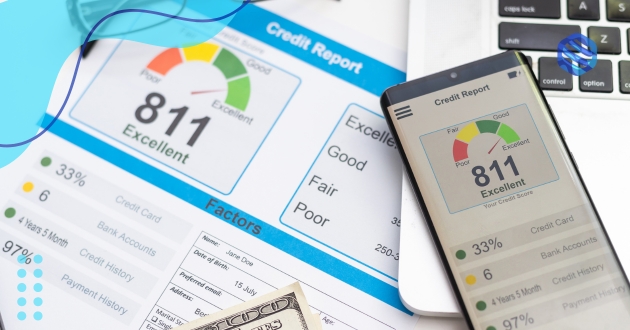Credit score improvement tips are essential for anyone looking to boost their financial health and unlock better opportunities for loans and credit. A strong credit score is a key factor in determining whether you qualify for favorable interest rates, mortgage approval, or even rental agreements.
Moreover, credit score improvement tips not only help you navigate the complex world of credit but also empower you to make informed decisions that can elevate your financial standing. From paying bills on time to monitoring your credit report regularly, these steps are crucial for maintaining a good credit score.
Finally, by focusing on practical credit score improvement tips, you can gradually see your score increase. With dedication and persistence, these strategies will help you establish stronger financial habits, reduce debt, and improve your creditworthiness over time.
1. Pay Your Bills on Time

Paying bills on time is the cornerstone of maintaining a good credit score. Payment history is one of the largest factors in determining your score, accounting for approximately 35% of your FICO score. Missing even one payment can have a lasting negative impact.
To ensure timely payments, consider setting up automatic payments for your bills or marking due dates on a calendar. These simple steps can help you avoid missing any deadlines and keep your credit score on the rise.
2. Reduce Your Credit Card Balances
Another key tip for improving your credit score is to reduce the balances on your credit cards. High credit utilization, which is the percentage of your available credit you’re using, can significantly lower your score. Ideally, aim to keep your credit utilization below 30%.
By paying down credit card balances, you not only improve your score but also reduce the interest charges you pay, making this a win-win strategy. If possible, focus on paying off cards with the highest interest rates first.
If you have multiple credit card balances, consolidating them into a single loan with a lower interest rate could be an effective way to manage your debt. This can make your payments more manageable and help you pay off balances faster.
3. Avoid Opening New Credit Accounts Frequently
Every time you apply for a new credit account, a hard inquiry is recorded on your credit report. Too many hard inquiries in a short period can lower your score and make you appear financially risky to lenders.
Before applying for new credit, carefully consider whether it’s necessary. If your goal is to improve your score, focusing on managing your existing accounts is a better approach.
4. Keep Old Accounts Open to Maintain Your Credit History (Credit score improvement tips)
One often overlooked factor in your credit score is the length of your credit history. Closing old accounts can shorten your history and negatively impact your score. Even if you’re not actively using a card, keeping it open can help maintain the average age of your accounts.
In contrast, closing accounts can reduce your available credit, which could increase your credit utilization ratio, further hurting your score. Therefore, it’s wise to keep your oldest accounts open unless they come with high annual fees.
5. Diversify Your Credit Mix
Lenders prefer to see a healthy mix of credit types, such as credit cards, installment loans, and mortgages. This diversity demonstrates your ability to manage different types of credit responsibly. If you only have credit cards, consider adding a small personal loan or another type of credit to diversify your mix.
However, be mindful not to take on debt just for the sake of improving your score. Ensure that any new credit products align with your overall financial goals.
6. Regularly Check Your Credit Report for Errors
Errors on your credit report can unfairly lower your score. Regularly checking your report allows you to catch any inaccuracies, such as incorrect account balances or fraudulent activity. Under federal law, you’re entitled to a free credit report from each of the three major credit bureaus every 12 months.
If you spot an error, dispute it immediately with the credit bureau. Correcting these mistakes can have an instant positive impact on your credit score.
7. Limit Hard Inquiries on Your Credit Report (Credit score improvement tips)
While occasional hard inquiries are normal, limiting them is important for protecting your credit score. Hard inquiries occur when lenders check your credit during the application process for new credit lines. Each inquiry can lower your score by a few points, and too many in a short time can significantly damage your credit.
To limit hard inquiries, only apply for new credit when absolutely necessary. Opt for pre-qualification tools that perform soft inquiries, which don’t affect your score, to gauge your chances of approval.
Utilize Personal Finance Education Tools to Enhance Your Credit Score
A key aspect of improving your credit score is having a solid understanding of personal finance. By leveraging comprehensive personal finance education tools, you can gain valuable insights into managing debt, budgeting effectively, and making informed decisions about credit.
These tools provide resources to help you track your financial habits, offering personalized strategies that align with your goal of boosting your credit score. Understanding how your financial actions impact your score is crucial in applying the best credit score improvement tips consistently and effectively.
Regularly Monitor Your Credit Report for Errors
One of the most effective credit score improvement tips is to regularly check your credit report for errors or inaccuracies. Even small mistakes, such as incorrect balances or unauthorized accounts, can significantly impact your score.
By staying proactive and reviewing your credit report through trusted agencies like Equifax, you can catch and dispute any errors early. Correcting these inaccuracies can lead to a noticeable improvement in your credit score, helping you maintain a more accurate and favorable credit profile.
Build a Strong Payment History (Credit score improvement tips)
A key aspect of maintaining a good credit score is establishing a strong payment history. Even if you’re starting with a low score, consistently paying off loans, credit cards, or other debts on time will gradually boost your score.
Lenders prioritize applicants who demonstrate responsible payment habits, as this indicates lower risk. Whether you’re paying utility bills or a mortgage, every timely payment contributes positively to your credit report.
Automate Your Payments
One way to ensure you never miss a payment is by automating your bills. Setting up automatic transfers for credit card payments, rent, or other obligations helps you avoid late fees and potential credit score damage.
Conclusion: Credit score improvement tips
In conclusion, improving your credit score requires patience, consistency, and a solid understanding of financial management. By applying key credit score improvement tips like paying your bills on time, reducing your credit card balances.
Additionally, maintaining a diverse credit mix and avoiding unnecessary new accounts are critical components of credit score improvement. By keeping old accounts open and limiting hard inquiries, you can preserve the positive aspects of your credit history while minimizing the potential negative impacts of too many credit applications.
Ultimately, improving your credit score is not just about numbers—it’s about developing strong financial habits that will benefit you in the long run. With the right strategies and consistent effort, you can build a healthier credit profile and unlock more favorable lending terms, lower interest rates, and greater financial stability.


